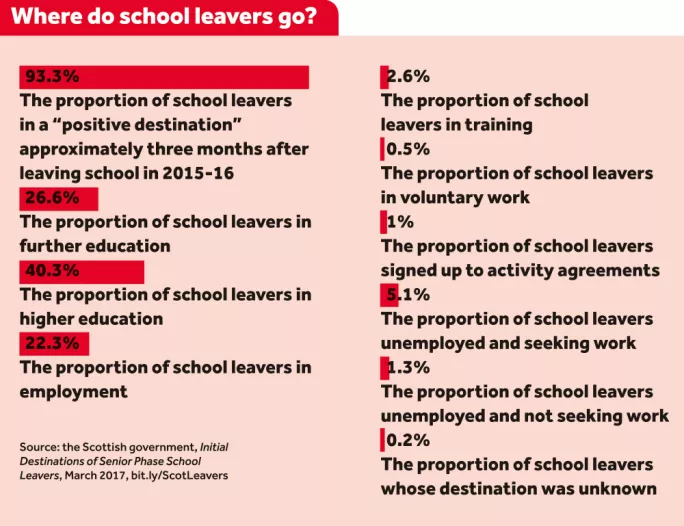Leavers in zero-hours jobs are classed as a success

The Scottish government has admitted for the first time that school leavers working on zero-hours contracts are classed as being in a “positive destination”.
This is despite the fact that zero-hours contracts “demean and exploit” workers, according to First Minister Nicola Sturgeon.
The high proportion of school leavers entering “positive destinations” is regularly used by the government and others to defend the performance of the Scottish education system.
However, Tes Scotland can confirm that a school leaver on a zero-hours contract would count towards these statistics. A Scottish government spokeswoman said that the definition of a positive destination “includes those who are employed and in receipt of payment from their employers” as well as “young people undertaking training in employment through national training programmes such as Modern Apprenticeships”.
‘Jobs without prospects’
Asked specifically whether this included zero-hours contracts, the spokeswoman said it included “all types of employment”. However, she stressed that the government was committed to discouraging “the use of exploitative zero-hours contracts and other non-standard types of employment that offer workers little or no job security”. Labour leader Kezia Dugdale accused Ms Sturgeon of using zero-hours contracts “to hide her failings on education and skills”.
The government’s clarification has also increased the pressure that it is under to reassess what counts as a positive destination, and to communicate this more clearly. More than 90 per cent of teenagers entered a positive destination on leaving school last year, including university, further education and employment, the statistics show. Just over 22 per cent were classed as employed.
Jim Thewliss, general secretary of School Leaders Scotland, called the definition of a positive destination “very, very woolly”.
“The parameters of what counts as a positive destination at the moment are so wide and open you can interpret it in more or less any way you want. Everybody in the systems needs to be made clear of what a positive destination is,” he said.
The head of the thinktank IPPR Scotland said the measure was “not ambitious enough” and that leavers entering low-paid, low-skilled jobs should not count as success. Russell Gunson said that counting low-skilled jobs as positive destinations risked “locking” school leavers into jobs without prospects that would give them a poor quality of life.

Career progression in Scotland was poor, meaning workers in low-skilled jobs were less mobile than in other parts of the UK, he added. “Aiming for a school leaver to go into any job, and likewise aiming for a college qualifier to go into any further learning, may not always be a positive destination, if the job is low-skilled and without prospects or the learning is at the same level in the same subject area,” said Mr Gunson.
According to the Office for National Statistics, the number of people in the UK on zero-hours contracts continues to rise. Between October and December last year, workers on zero-hours contracts hit 905,000 - an increase of more than 100,000 compared with the previous year.
A third of those on zero-hours contracts were aged 16 to 24.
Professor John McKendrick, an expert in child poverty based at Glasgow Caledonian University, said: “If [the government’s] position is that this kind of contract is bad per se and they will do all they can to reduce it, but then they are prepared to count these contracts as a positive destination, it says something about how this government regards young people - they are paying lip service to young people.” He suggested the measure should be renamed “not negative destinations”, and that if the government wanted to record positive destinations it needed to find out more about the kinds of employment or education young people were engaging in.
Professor McKendrick continued: “If we want to measure positive destinations, we need better data to achieve that.”
‘Poor’ quality of life
Some of the destinations currently defined as positive - including zero-hours contracts - would not allow people to “live independently and have a good life”, said Cristina Iannelli, a University of Edinburgh professor of education and social stratification.
Last year, speaking to Tes Scotland, Keir Bloomer - a former education director and convener of the Royal Society of Edinburgh’s education committee - described the statistics as a “fraud” and said they included “dead-end jobs”, where young people were working for the minimum wage.
A Scottish government spokeswoman said: “This year’s data shows that Scotland has more school leavers going on to positive destinations - a record 93.3 per cent in 2015-16, up from 90.1 per cent in 2011-12.
“The school leaver destination statistics are produced to high professional standards set out in the Code of Practice for Official Statistics and provide important information about the outcomes for our young people after they leave school and how these change over time.
“However, it is important to note that the leaver destination statistics are not the only measure of the progress of our young people.”
She added that the government was committed to creating a culture of fair work throughout all workplaces which discouraged “exploitative zero-hours contracts”.
You need a Tes subscription to read this article
Subscribe now to read this article and get other subscriber-only content:
- Unlimited access to all Tes magazine content
- Exclusive subscriber-only stories
- Award-winning email newsletters
Already a subscriber? Log in
You need a subscription to read this article
Subscribe now to read this article and get other subscriber-only content, including:
- Unlimited access to all Tes magazine content
- Exclusive subscriber-only stories
- Award-winning email newsletters